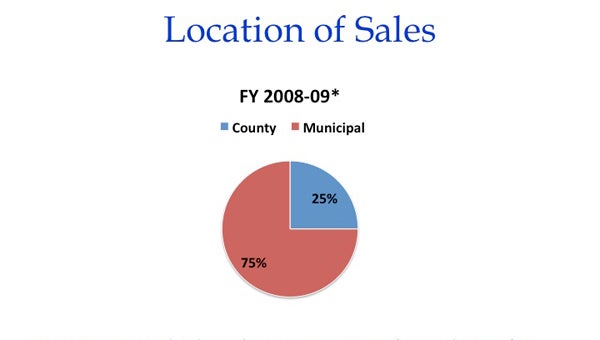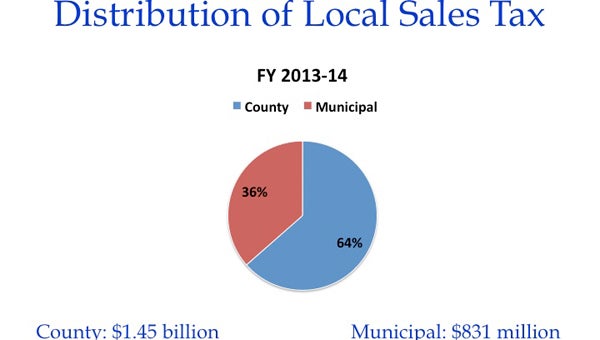Taxing situation: Sales-tax distribution Changes would affect Municipalities’ finances
Published 7:25 pm Tuesday, June 16, 2015

THE STORY: These pie charts show that although 75 percent of sales taxes are paid in cities, towns and villages, those municipalities receive 36 percent of sales-tax revenues when those revenues are distributed by counties. Some municipal leaders are exploring the possibility of asking the N.C. General Assembly for authority to levy their own sales taxes and keeping all the revenue such taxes generate.
The state’s municipalities are keeping a close watch on what the N.C. General Assembly might do with how revenues from sales taxes are distributed to them.
The issue was discussed during a meeting — A Path Forward: Vibrant Cities Today and Tomorrow — conducted in Greenville on Monday by the N.C. League of Municipalities. Changes in the distribution formula likely would affect the finances of the state’s cities, towns and villages — some positively, others negatively.
Under proposed legislation (House Bill 117) in the General Assembly, the distribution formula would be changed during a four-year schedule. Currently, sales-tax revenues are distributed to municipalities this way: 25 percent on a per-capita basis and 75 percent on a point-of-collection basis. Under the proposed plan the revenue would be distributed this way after four years: 80 percent on a per-capita basis and 20 percent on a point-of-collection basis.
In the first three years of the plan, the per-capita basis percentage would to move to 40 percent, then to 55 percent, then to 70 percent, reaching the 80-percent mark in fiscal year 2019-2020. The point-of-collection percentage would decline from 75 percent, to 60 percent, to 45 percent to 30 percent, reaching the 20-perent mark in fiscal year 2019-2020.
Under that proposed formula, all of Beaufort County’s seven municipalities — Washington, Aurora, Bath, Belhaven, Chocowinity, Pantego and Washington Park — likely would see more revenues generated by sales taxes.
Under the current law, Washington would receive a projected $2.195 million in sales-tax revenue during the 2015-2016 fiscal year, which begins July 1. Under the proposed formula, Washington would receive a project $2.240 million during the 2015-2016 fiscal year. Beaufort County and its other six municipalities would see similar gains under the proposed formula in the upcoming fiscal year.
The proposed distribution formula would benefit the state’s more-rural areas to the detriment of the state’s urban areas, according to municipal officials and NCLM board members such as Patsy Kinsey, a former mayor of Charlotte.
Anne-Marie Knighton, town manager of Edenton, likened the proposed change to the Robin Hood philosophy of taking from the rich to give to the poor. Although small municipalities like Edenton would benefit from the proposed change, Knighton said, such a one-size-fits-all approach to distribution of sales-tax revenue is not the perfect answer when it comes to providing revenue to poorer areas of the state. The Robin Hood approach isn’t fair to the urban areas, she said.
Knighton and other municipal officials at the Greenville meeting expect urban areas such as the Mecklenburg County-Charlotte area to vigorously fight the proposed change to the distribution formula because they stand to lose millions of dollars.
What would be fair is for the state to allow municipalities more flexibility (more options) in finding revenue sources other than property taxes, she said.
If the proposed change in the distribution formula for sales-tax revenue is changed, that’s “going to be a good thing” for eastern North Carolina, said Lamont Wiggins, a Rocky Mount councilman. Wiggins supports lobbying the General Assembly for legislation that would allow municipalities to implement their own sales taxes. Revenue raised by such a tax would go directly to the municipality for use exclusively by that municipality. Counties would not benefit from such a sales tax, he said.
Currently, counties distribute sales-tax revenues to their cities, towns and villages either on a per-capita basis or property-tax basis.
As for point-of-collection data related to sales taxes, it would be impractical, if not extremely difficult, to determine how much of sales tax a person from one county pays in another county or that county’s municipalities. For example, for Washington (in Beaufort County) residents paying sales taxes in Greenville (in Pitt County), it would be difficult, if not nearly impossible, to determine how much of the point-of-collection sales tax collected in Greenville comes from Washington residents, according to municipal officials. Thusly, it would be nearly impossible to determine how much sales-tax revenue Washington and Beaufort County lose because their residents shop in Pitt County and Greenville or other places outside the county.
Supporters of House Bill 117 contend the proposed formula would return sales-tax revenue to areas whose residents shop elsewhere and pay sales tax there.
The North Carolina League of Municipalities is a membership association of 540 great hometowns that represents nearly every municipality in the state. It advocates for its members, from the largest city to the smallest village, on the full range of legislative issues that affect municipalities.
What House Bill 117 does
• Alters distribution of sales tax revenue, converting it from the current 75 percent point of sale/25 percent per capita distribution to an 80 percent per capita/20 percent point of sale distribution over four years;
• Expands the sales tax base to include installation, repair, and maintenance of tangible personal property as well as veterinary and pet-care services;
• Phases in a reduction of the cap on sales tax refunds that nonprofits receive;
• Provides most counties with the authority to levy, by referendum, an additional 1/2-cent in local sales tax, while also placing a cap on the total local sales tax rate at 2.5 cents for all counties but Durham and Orange. None of this additional sales-tax revenue would be shared with municipalities.
What House Bill 117 does not do
• Does not convert the locally levied sales tax to a state revenue;
• Does not make anything besides technical changes to the existing city hold-harmless formula;
• Does not make any changes to the current system that allows counties to choose the formula for distributing sales-tax revenues to municipalities within its borders;
• Does not provide cities with any additional revenue options beyond the sales tax.
Source: N.C. League of Municipalities







